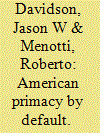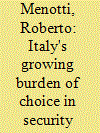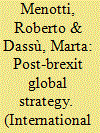|
|
|
Sort Order |
|
|
|
Items / Page
|
|
|
|
|
|
|
| Srl | Item |
| 1 |
ID:
090605


|
|
|
|
|
| Publication |
2009.
|
| Summary/Abstract |
American primacy continues to characterise the international system, despite trends toward a diffusion of power. The discussion is too often biased in favour of multipolarity due to imprecise or misleading definitions of US primacy. On the basis of a simple definition of what a "pole" is, combining GDP and defence expenditure, only the US can be considered a global pole. The current economic crisis is not changing this reality. Even considering perceptions, soft power, and the ability to translate power into influence, rising powers like China or an aggregate power like the EU have a long way to go before they can get on an equal footing with the United States.
|
|
|
|
|
|
|
|
|
|
|
|
|
|
|
|
| 2 |
ID:
060773


|
|
|
|
|
| Publication |
2005.
|
| Description |
105-122
|
| Summary/Abstract |
George W. Bush won the November 2004 US elections against the overwhelming sentiment of Europe's citizenry. In theory, this could reinforce the sense of alienation across the Atlantic, pushing Europe increasingly to define itself in opposition to America. In practice, Bush's second term offers the chance of a transatlantic new deal: a more pragmatic relationship, based upon a reassessment of common interests in the post-bipolar world. Such a new deal would require Washington once more to embrace the assumption that European unity is in the American national interest. It would also require the European Union to concentrate on managing security in and around the European space, being ready and able to use military force as necessary. America would take the lead elsewhere, with Europeans offering military and other support where they could achieve a European consensus for action
|
|
|
|
|
|
|
|
|
|
|
|
|
|
|
|
| 3 |
ID:
080389


|
|
|
|
|
| Publication |
2007.
|
| Summary/Abstract |
NATO, the EU, and the UN have been the cornerstones of Italy's foreign policy since WWII: although they continue to provide a point of reference, these institutions are undergoing major changes that reflect - and partly create - a very unpredictable international environment. The evolving security agenda, choices made by key allies (especially the United States), and domestic political forces are putting Italian decision-makers under pressure. There is a serious problem of resource constraints while the country is still unwilling to make clear-cut choices based on unavoidable tradeoffs. The past few years have witnessed a mix of continuity and change due to the political orientations of successive governments under these challenging circumstances.
|
|
|
|
|
|
|
|
|
|
|
|
|
|
|
|
| 4 |
ID:
147916


|
|
|
|
|
| Summary/Abstract |
The interview with Nathalie Tocci starts out with the Brexit issue. Here, we fundamentally agree with the argument that it would have been pointless to postpone publication of the Global Strategy. Timing may indeed be particularly relevant to PR exercises and media campaigns, but we expect much more from this particular document than just sending a set of well packaged messages to the public. The Global Strategy – even more than its 2003 predecessor – ought to become the pillar for consensus-building among the member states on a vast array of interconnected risk assessments, tasks and policies. As such, the document is a starting point and a platform for developing more detailed and sectoral policy documents. It is obvious that the Brexit vote (which, we should recall, does not constitute the UK’s instant exit from the Union) cast a new light on the whole edifice of the EU’s foreign and security policy; yet, the rationale for a comprehensive analysis of the EU’s options is clearly there, just as it was before 23 June.
|
|
|
|
|
|
|
|
|
|
|
|
|
|
|
|
|
|
|
|
|